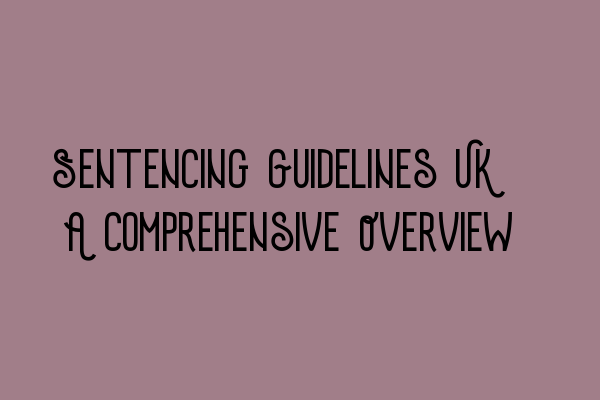Sentencing Guidelines UK: A Comprehensive Overview
When it comes to criminal law in the United Kingdom, one of the most important aspects is the determination of appropriate sentences for convicted individuals. Sentencing guidelines play a crucial role in ensuring consistency and fairness in the application of justice. In this article, we will provide a comprehensive overview of the sentencing guidelines in the UK, exploring their purpose, key principles, and factors considered.
Understanding Sentencing Guidelines
In the UK, sentencing guidelines are created by the Sentencing Council, an independent body responsible for developing consistent and transparent sentencing guidelines for criminal offenses. These guidelines act as a framework for judges and magistrates, helping them determine the most appropriate sentence for a particular offense.
It is important to note that sentencing guidelines are not mandatory, but they are highly influential. Judges and magistrates are required to follow them unless it is in the interest of justice not to do so. Sentencing guidelines are regularly updated to reflect changes in legislation, societal expectations, and emerging issues.
The Purpose of Sentencing Guidelines
The primary purpose of sentencing guidelines is to promote consistency and transparency in sentencing decisions. They aim to ensure that similar offenses receive similar sentences, regardless of where the case is heard or who the judge or magistrate is. This helps in maintaining public confidence in the justice system.
Furthermore, sentencing guidelines provide guidance to judges and magistrates in determining appropriate sentences by considering the seriousness of the offense and the personal circumstances of the offender. This promotes proportionality and individualized justice.
Key Principles in Sentencing Guidelines
The sentencing guidelines in the UK are guided by several key principles:
- Proportionality: The sentence should be proportionate to the seriousness of the offense.
- Equality: Similar offenses should receive similar sentences.
- Parliamentary Intention: The guidelines should give effect to relevant legislation.
- Public Protection: Public safety should be considered, especially in relation to serious or violent offenses.
- Reducing Re-offending: Rehabilitation and preventing future criminal behavior should be prioritized.
- Individual Circumstances: The personal circumstances of the offender should be taken into account, including factors such as age, mental health, and previous convictions.
Factors Considered in Sentencing
When determining an appropriate sentence, judges and magistrates consider several factors:
- The seriousness of the offense.
- Any aggravating or mitigating factors.
- The offender’s level of culpability.
- The harm caused to the victim or society.
- The impact on any victims or communities affected.
- The offender’s previous convictions and behavior.
- The level of remorse shown by the offender.
- Whether the offense was premeditated or spontaneous.
This list is not exhaustive, as each case is unique and requires careful consideration.
Conclusion
Sentencing guidelines are an essential aspect of the UK criminal justice system. They provide a framework for judges and magistrates to determine appropriate sentences that are consistent, transparent, and proportionate. By taking into account the seriousness of the offense and the personal circumstances of the offender, sentencing guidelines promote fairness and individualized justice.
If you’re interested in preparing for your SQE exams or looking for practice resources, be sure to check out these related articles:
